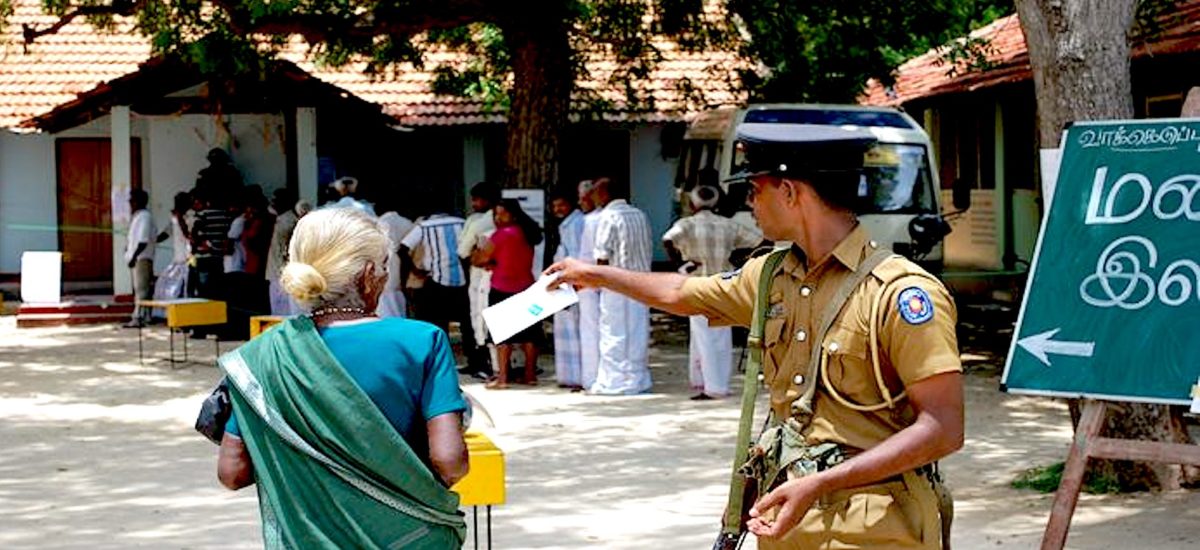Photo courtesy of e-ir
The year 2024 is an election year in Sri Lanka with the president’s term of office ending on November 17, 2024 and accordingly the conduct of a presidential election constitutionally mandated upon the Election Commission between September and October this year. The ousting of former president Gotabaya Rajapaksa through the mass protests of the aragalaya two years ago has been raised afresh in the public consciousness through the publications of his memoirs, The Conspiracy to oust me from the presidency, a rather blatant attempt at blaming everyone but the Rajapaksas’ gross mismanagement of the country for the mass uprising that resulted in the end of his short lived and unlamented administration. The presidential election of 2024 is the first and most decisive of Sri Lankan democracy’s attempt since 2022 to publicly elect and grant a popular mandate to the office of president of the republic.
The politics of 2024 are being clearly laid out as a three corned race. As incumbent in office, the first contender is President Ranil Wickremesinghe, propped up and kept in power by the rump parliamentary majority of the Rajapaksas’ SLPP, a political formation that lost its popular mandate along with their president in 2022 but continues to control parliament and back the single seat UNP’s president. The official opposition led by the Leader of the Opposition Sajith Premadasa and his SJB is the obvious alternative to an administration lacking a popular mandate. To his credit Mr. Premadasa has succeeded in preventing a takeover of his party by the UNP, which party he decimated in the general elections of 2020 in the maiden electoral outing of his SJB. By all accounts, the various attempts by President Wickremesinghe and the UNP to dump the SLPP and pivot to the SJB for the presidential poll has now been ended.
However, according to reliable opinion surveys, the surprising front runner in the 2024 presidential poll is the left wing JVP and its leader, Anura Kumara Dissanayake. Polling just above 3% of the popular vote in the 2019 presidential election, the JVP was always a distant third and very much an also ran in prior elections and Sri Lankan politics in general. Garnering about 4% of the vote in the parliamentary elections of 2020, it secured just three seats. However as voters repudiate Rajapaksa governance and its associated politics, which brought about national economic collapse in just two short years ironically based on a promise of creating splendor and prosperity, the beneficiary of much of the Rajapaksas’ self-implosion seems to have been the JVP much more so than the main opposition SJB. Some of the dynamics at play are worth examining. We are more than six months away from the presidential elections, a near eternity in politics. Much can change in the relatively unchartered terrain of the new three way race and the large number of undecided voters who would be really the deciding factor at the coming election.
The presidential elections of November 2019 was all about national security after the coordinated Easter bomb attacks of April 2019. Ironically, we went from national security to national collapse in two years with no real justice or truth about the perpetrators of the Easter bomb attack except for a growing belief in the country that these attacks had the sanction and support of the deep state, especially after the UK Channel 4’s expose alleging the same. However the aragalaya and the economic collapse changed the political discourse in the country. We went from racial dog whistling and openly anti-minority politics to the politics of social justice. The real and lasting political problem for the Rajapaksas and the SLPP is not just that they destroyed the economy but that their political ideology of majoritarian nationalism was discredited and discarded by the public, along with their governance.
The JVP rather than the SJB was the beneficiary of this new post racial, social justice political ethos. Almost overtly racist during their violent second insurrection of 1988-89 through a rejection of even the provincial councils, the JVP over the years more mainstreamed their ethnic policies along communist ideology, which emphasizes socio political class divides over ethnic ones. This didn’t hold much sway in the ethnically polarized Sri Lanka of the past but the economic collapse of 2022 was a massive shock to the system, which resulted in swift and significant changes to the popular consciousness and ethos.
The JVP tapped into the mass suffering and pain of the vast majority of the populace. While our economy has stabilized and recovered, its benefits have been largely to the first and second percentiles or twenty percent of the population who earn close to about two thirds of our national income in an economy with an extremely skewed income distribution. The UNP-SLPP administration has been tone deaf to the pain of the majority with high malnutrition and huge drops in purchasing power and quality of life from public education and health to rural electrification. Over half a million households had electricity disconnected during the year. We are taking people off the national grid, not adding new consumers. The JVP, better than the SJB, has tapped into that pain and suffering.
But these are early days in the presidential election race of 2024 and the election is still Opposition Leader Sajith Premadasa’s to loose. He much more so than the old traditional UNP elites comes from a political tradition and track record of feeling the common man’s pain, of working towards universal housing and social security for all with much more credibility than the JVP. However one thing is certain; the repudiation of the Rajapaksa political brand in 2024 would be fairly decisive.

